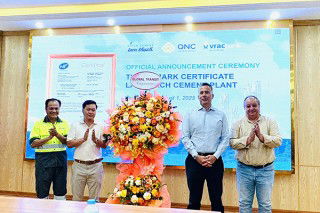The largest carbon market in China began yesterday with cement firms eager to take part in early deals. Anhui Hailuo bought 20,000 carbon permits from the new energy arm of power producer Huadian Energy Co. Debut trading on the China Emissions Exchange in Guangzhou went through in line with market expectations at CNY61 (US$10.04).
Early trade on the Guangzhou market surpassed full-day totals during the launches of the country’s three other carbon exchanges. There were a total of 120,000 permits, known as Guangdong Emissions Allowances, in the first 20 minutes of the trade, all at CNY60 each. China’s other emissions markets each saw around half that volume during their entire debut days.
Guangdong’s carbon programme caps CO2 emissions from 242 of the province’s major power generators and cement, iron and steel producers at 350Mta, with a further 38Mt set aside in reserves for new entrants and potential adjustments. Companies are forced to pay for three per cent of their expected emissions in the first year of the programme, with that share gradually rising in the future.
China wants to use markets to achieve its target to cut emissions per unit of gross domestic product to 40-45 per cent below 2005 levels by 2020 at the lowest possible cost.
Beijing, Shanghai and Shenzhen have already opened markets of their own, with Hubei Province and the cities of Chongqing and Tianjin expected to follow in the next few months. Beijing permits trade around CNY50, while in Shanghai they change hands at around CNY25. In Shenzhen, permits currently trade at CNY73.50, with prices pushed up on small volumes by private speculators after the market opened at CNY28 in June. Observers say the varying price levels in the Chinese markets do not necessarily reflect real differences in how scarce permits are.
Some trade experts warned against the risk of price volatility in the longer term. Emissions markets are often very price sensitive in early stages, as seen in markets in Europe, New Zealand and Shenzhen.
“The biggest concern for companies is how to manage volatility risks. That’s more important than who and how much traded today,” said Jeff Huang, China director of the Intercontinental Exchange.
Guangdong is set to become China’s central carbon trading hub in the near term as its number of carbon permits dwarfs the combined volume in Beijing, Shanghai and Shenzhen. Globally, it will trail only the European Union where allowances currently trade at US$6.81.
Guangdong’s provincial government said that it would expand the market to cover five new sectors, including textiles, paper production and metals, although it gave no timeline.

Quang Ninh Cement achieves double certification win
Quang Ninh Cement Co’s Lam Thach plant in Halong Bay region, northern Vietnam, is the first ceme...